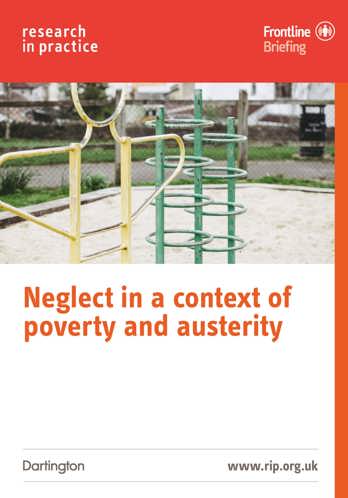Neglect in a context of poverty and austerity: Frontline Briefing (2019)
Introduction
Everyone working within children’s services will benefit from developing their knowledge and awareness of family poverty. In 2019 UK social work is taking place in a context of rising child poverty exacerbated by national policies that place the brunt of austerity on children and families (Cribb, Hood, Joyce and Keiller, 2017).
- Child poverty has been rising since 2011. While the total number of children has risen by 3 per cent, the number of children in poverty has risen by 15 per cent. Virtually all of this rise has taken place within working families (Barnard et al, 2018).
- As changes to tax credits and Universal Credit roll out this proportion is predicted to rise. While overall, absolute, poverty is projected to increase by about one percentage point between 2015 and 2022, absolute child poverty is projected to rise by around four percentage points (Cribb et al, 2017). As a result, 30 per cent of children, or 4.1 million, were living in relative poverty in 2017-18 in the UK; 70 per cent of these were in working families.
- Compared to other OECD countries, the UK has high levels of income inequality and an economy in which ‘the redistributive effects of taxation and benefits are amongst the weakest in Europe’ (Bywaters et al, 2017a).
- We have a much clearer picture of the unequal burden of austerity borne by children and families in deprived communities thanks to the Child Welfare Inequalities research project (www.coventry.ac.uk/CWIP). This research makes evident the effects of ‘austerity policies eating into the capacity of both families and local authorities to provide for children’s wellbeing’ (Bywaters et al, 2017a). The work shows how local authorities with the highest levels of deprivation have higher numbers of children involved with statutory social care services and have experienced bigger cuts to the funding they receive, resulting in reduced spending on early help and prevention (Bywaters et al, 2017a).
Though the scale and impact of family poverty can feel overwhelming, individual practitioners have an important role to play in recognising and mitigating its effects.
When almost all the families that children’s services work with are experiencing financial hardship, it can become ‘the wallpaper of practice’ - so familiar that it is not discussed as a factor affecting parents’ ability to care for their children (Morris et al, 2018b). When social work is practiced ‘within a wider political context where poverty is individualised, stigmatised and the issues of poverty and parenting are being disaggregated’ (Haworth, 2018), and within a professional culture that centres on assessing need and risk as ‘core business’, this can lead practitioners to hone in on individuated issues or behaviours and pay insufficient attention to structural causes of those behaviours (Featherstone et al, 2018).
This briefing explores the complex interaction between family poverty and concerns about neglect of children by their caregivers. It encourages practitioners to reflect on:
- The impact of poverty on families and their ability to meet their children’s needs, including experience of discrimination and stigma.
- The types of support that can help mitigate the impact of poverty on parenting and children’s outcomes.
- The way that practitioner interactions with families can re-enforce or relieve some of that feeling of blame and disempowerment.
Professional Standards
PQS:KSS - Relationships and effective direct work | Communication | Adult mental ill health, substance misuse, domestic abuse, physical ill health and disability | Abuse and neglect of children | Child and family assessment | Developing confident and capable social workers | Promoting and supporting critical analysis and decision-making
PCF - Diversity and equality | Values and ethics | Rights, justice and economic wellbeing | Intervention and skills | Contexts and organisations
This publication is a premium resource
Access the full publication with a one-off purchase or enjoy the benefits of membership.

